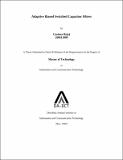Please use this identifier to cite or link to this item:
http://drsr.daiict.ac.in//handle/123456789/189| Title: | Adaptive biased switched capacitor filters |
| Authors: | Parikh, Chetan D. Bajaj, Garima |
| Keywords: | Switched capacitor circuits Low voltage integrated circuits Switched capacitor filters Metal oxide semiconductors Integrated circuits |
| Issue Date: | 2008 |
| Publisher: | Dhirubhai Ambani Institute of Information and Communication Technology |
| Citation: | Bajaj, Garima (2008). Adaptive biased switched capacitor filters. Dhirubhai Ambani Institute of Information and Communication Technology, ix, 51 p. (Acc.No: T00152) |
| Abstract: | The demand from today’s handheld devices, such as laptop, ipod, cellphones is to have a long battery life with no compromises in speed. The devices dissipate power even in standby mode also. Op-amp is a major block in all these devices. Its application in these devices may be as an amplifier, filter, A/D or D/A convertor. In most of the cases the op-amp may be in standby mode with no input signal. Power dissipated in these standby periods is wasted, and this is of concern for two reasons. First, in battery powered equipment, supply power must be conserved to extend the battery life. Second, any power wasted in the circuit is dissipated in the active devices which mean that they operate at higher temperatures and thus have a greater chance of failure. So the point of major concern is to reduce power in standby modes, and to give high speed when the device is operating. This research work makes an attempt to design the most common application of Op-amp, a filter, such that it consumes low power with no compromise in speed. It ensures that the load capacitor of op-amp settles to the final value at a much faster speed, and at the same time consuming less power in stand by mode. The filter is designed for a cut off frequency of 100KHz at 2.5V in 0.18μm technology. The filter with a higher cut off frequency requires higher current and thus results in large power dissipation. The two Op-amps discussed, are proved and verified that they consume very less power for such a high cut off frequency. |
| URI: | http://drsr.daiict.ac.in/handle/123456789/189 |
| Appears in Collections: | M Tech Dissertations |
Files in This Item:
| File | Description | Size | Format | |
|---|---|---|---|---|
| 200611009.pdf Restricted Access | 1.24 MB | Adobe PDF |  View/Open Request a copy |
Items in DSpace are protected by copyright, with all rights reserved, unless otherwise indicated.
